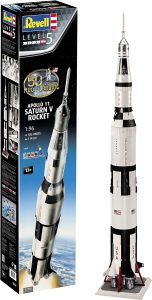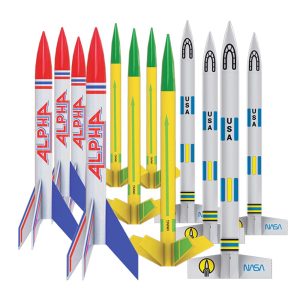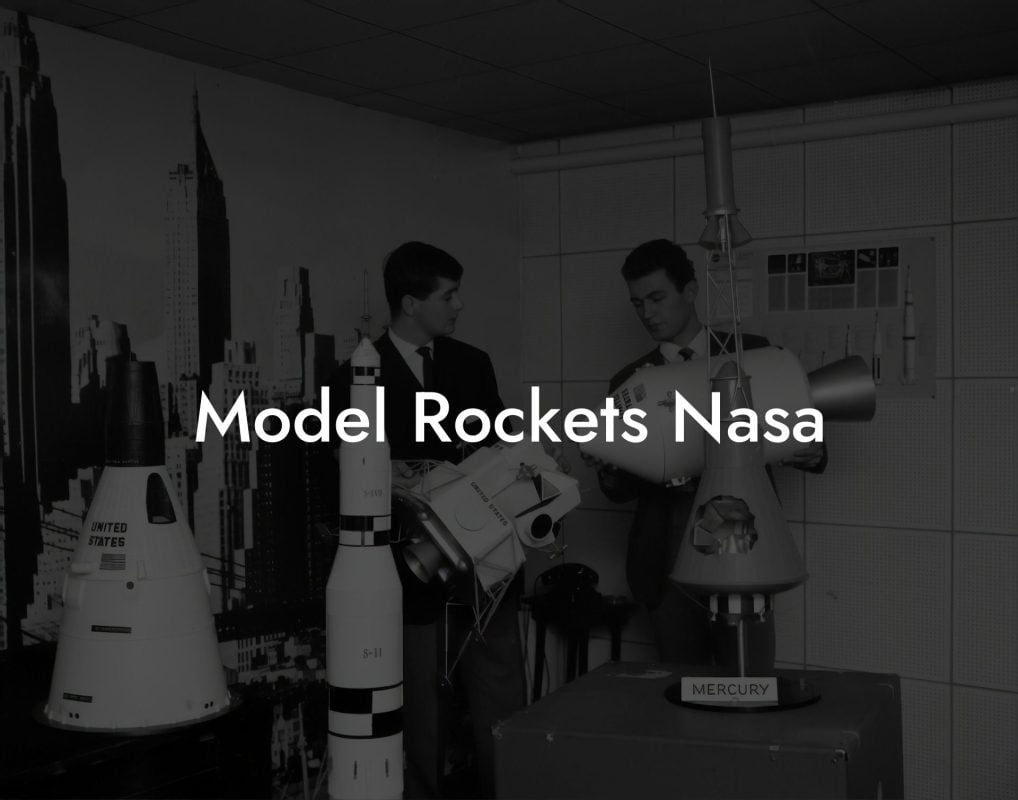Imagine soaring to new heights with your model rockets, equipped with cutting-edge GPS units that track every move, every trajectory, and every triumph. Welcome to the world of high-powered model rockets, where precision, innovation, and thrill-seeking converge. Whether you're a seasoned enthusiast or just starting your rocketry journey, this comprehensive guide will propel you into the stratosphere of GPS-enabled model rocketry, exploring the latest technologies, expert techniques, and essential tools for success.
Quick Links to Useful Sections
- What Are GPS Units for High-Powered Model Rockets?
- The Benefits of GPS Units for Model Rockets
- Choosing the Right GPS Unit for Your model rocket
- Setting Up and Configuring Your GPS Unit
- Expert Tips and Tricks for GPS-Enabled Model Rocketry
- GPS Unit Maintenance and Troubleshooting
- Resources and Community Support: Your Next Steps
- Frequently Asked Questions: GPS Units for Model Rockets
What Are GPS Units for High-Powered Model Rockets?
GPS (Global Positioning System) units for model rockets are sophisticated devices that utilize a network of satellites orbiting the Earth to provide precise location data, velocity, and altitude information. These compact, lightweight modules are specifically designed for high-powered model rockets, offering unparalleled tracking capabilities, real-time telemetry, and enhanced safety features.
By integrating a GPS unit into your model rocket, you can monitor its flight path, velocity, and altitude in real-time, ensuring a more accurate and controlled descent. This technology also enables you to pinpoint the rocket's landing site, making recovery a breeze.
The Benefits of GPS Units for Model Rockets
The advantages of using GPS units in high-powered model rockets are numerous and significant:
- Enhanced Safety: GPS units provide real-time tracking, reducing the risk of lost rockets and ensuring a safe recovery.
- Improved Accuracy: GPS technology offers precise location data, allowing you to refine your launch and recovery techniques.
- Increased Efficiency: With GPS, you can quickly locate your rocket after launch, saving time and effort.
- Real-Time Telemetry: GPS units provide instant access to flight data, enabling you to analyze and optimize your rocket's performance.
Choosing the Right GPS Unit for Your model rocket
When selecting a GPS unit for your high-powered model rocket, consider the following key factors:
Looking For The Best Model Rocket Kits? You'll Love These:
- Compatibility: Ensure the GPS unit is compatible with your rocket's electronics and power system.
- Accuracy: Look for GPS units with high accuracy and precision, typically measured in meters or feet.
- Size and Weight: Choose a GPS unit that is compact and lightweight, minimizing its impact on your rocket's performance.
- Power Consumption: Select a GPS unit with low power consumption to minimize battery drain.
Setting Up and Configuring Your GPS Unit
To get the most out of your GPS unit, follow these essential setup and configuration steps:
- Install the GPS Unit: Mount the GPS unit securely in your rocket, ensuring proper alignment and minimal interference.
- Configure the GPS Settings: Set the GPS unit's baud rate, data format, and other parameters according to the manufacturer's instructions.
- Pair the GPS Unit with Your Receiver: Connect the GPS unit to your receiver or telemetry system, ensuring seamless data transmission.
- Test and Calibrate: Perform thorough tests and calibrations to ensure the GPS unit is functioning accurately and reliably.
Expert Tips and Tricks for GPS-Enabled Model Rocketry
Take your model rocketry skills to the next level with these expert tips and tricks:
- Use a GPS Unit with a Built-In Accelerometer: This feature provides additional data on your rocket's acceleration and deceleration.
- Implement a Telemetry System: Integrate a telemetry system to receive real-time data and enhance your rocket's performance.
- Optimize Your Rocket's Design: Use GPS data to refine your rocket's design, improving its aerodynamics and stability.
- Join a Model Rocketry community: Connect with fellow enthusiasts, share knowledge, and learn from their experiences.
GPS Unit Maintenance and Troubleshooting
To ensure your GPS unit remains in top condition, follow these maintenance and troubleshooting tips:
- Regularly Update Firmware: Stay up-to-date with the latest firmware releases to ensure optimal performance.
- Clean and Inspect the GPS Unit: Regularly clean the GPS unit and inspect for signs of damage or wear.
- Troubleshoot Common Issues: Identify and resolve common issues, such as signal loss or inaccurate data, using the manufacturer's guidelines.
Resources and Community Support: Your Next Steps
Embark on your GPS-enabled model rocketry journey with confidence, leveraging these valuable resources and community support:
- Manufacturer's Documentation: Consult the GPS unit manufacturer's documentation and support resources.
- Model Rocketry Forums and Communities: Join online forums and communities to connect with fellow enthusiasts, share knowledge, and learn from their experiences.
- Local Model Rocketry Clubs: Participate in local model rocketry clubs and events to network with like-minded individuals and gain hands-on experience.
Frequently Asked Questions: GPS Units for Model Rockets
Get answers to your most pressing questions about GPS units for model rockets:
1. What is the accuracy of GPS units for model rockets?
GPS units for model rockets typically offer accuracy within 1-5 meters (3-16 feet).
2. Can I use a GPS unit for high-powered model rockets in extreme weather conditions?
Yes, many GPS units are designed to operate in extreme weather conditions, including high winds, heavy rain, and freezing temperatures.
3. How do I choose the right GPS unit for my model rocket?
Consider factors such as compatibility, accuracy, size, weight, and power consumption when selecting a GPS unit for your model rocket.
4. Can I use a GPS unit with my existing model rocket electronics?
Yes, many GPS units are designed to be compatible with existing model rocket electronics, but ensure compatibility before making a purchase.
5. How do I troubleshoot common GPS unit issues?
Refer to the manufacturer's documentation and support resources for troubleshooting guidance on common GPS unit issues.
Looking For The Best Model Rocket Kits? You'll Love These:
Useful Interruption: Dive deeper into the world of Model Rockets with our most popular sections. If there is anything you think is missing or anything you would love for us to write about, just give us a shout.
- Getting Started & Basics With Model Rockets
- Model Rocket Design, Build & Customization
- Model Rocket Propulsion & Engine Technology
- Model Rocket Launch Techniques & Recovery
- Model Rocket Advanced Rocketry & Innovations
- Model Rocket DIY and Customization
- Model Rocket Equipment Reviews & Digital Tools
- Community, Competitions & Education
- Model Rocket Troubleshooting & FAQs
- Model Rocket Bonus/Seasonal & Niche Topics
A group of model rocket enthusiasts gathered at a field for their weekly launch event. Among them was Dave, a seasoned builder known for pushing the limits of hobby rocketry. This time, he had outdone himself.
“Ladies and gentlemen,” Dave announced, dramatically pulling a cloth off his latest creation, “I present to you: The Kraken!”
The crowd gasped. This wasn’t just a model rocket, it was a monster. The thing stood 8 feet tall, had six clustered engines, and was covered in enough duct tape to qualify as a classified aerospace project.
“Dave,” muttered Steve, the cautious safety officer, “Have you, uh… done the math on this?”
“Math?” Dave scoffed. “I built it in my garage at 3 a.m. with parts from eBay. This is an art piece, Steve.”
The countdown began.
5…
4…
3…
2…
1…
The engines ignited with a BOOM, and The Kraken shot up… kind of. It immediately did a violent barrel roll, narrowly missing the spectators before skyrocketing at an angle that could only be described as “legally questionable.”
The crowd collectively ducked as The Kraken flew straight over the adjacent cornfield, where Old Man Jenkins, the grumpiest farmer in town, was minding his business.
KABOOM!
The rocket disappeared behind the barn. A moment later, a flaming piece of Estes igniter wire landed at Steve’s feet. The silence was deafening.
And then, an unmistakable sound echoed across the field.
Jenkins’ shotgun being cocked.
“DAVE!!!” Steve shouted. “RUN.”
And that was the day Dave invented the first-ever biologically powered rocket booster: pure adrenaline.
To this day, nobody knows where The Kraken landed, but legend has it, it still haunts the skies, terrifying unsuspecting drones and low-flying birds.















